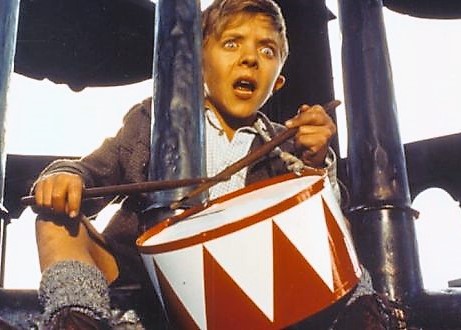
Are school textbooks conveying hatred to young people? Palestinians and Israelis have both been criticised for depicting the other as intrinsically hateful. The consequence of where this sort of education may lead is portrayed by Gunter Grass in his classic novel The Tin Drum, where a young boy looks at adults as hypocritical and evil. Above, a picture from a movie based on The Tin Drum
THERE is so much hatred in the Israeli-Palestinian conflict after 70 years, it is impossible to conceive of children not absorbing it. Whatever one’s view about the politics of the conflict, both sides face the question of what to teach their children. For Israelis: Are all Palestinians terrorists? For Palestinians: Are all Israelis oppressors? To sane adults, it is obvious neither side can be simply defined. But can a small child withstand the cynicism and expediency of adults?
All societies at war, or after it, face the dilemma of educating children amidst rage about what has happened. What should Jewish educators teach about Germans after the Holocaust? Or Rwandan Tutsis about the Hutus who killed 800,000 Tutsis in the 1994 genocide? After apartheid’s end, what should black South Africans teach their children about white South Africans? As conflicts continue erupting and the phrase “never again” becomes hollower, the problem gets worse.
German writer Gunter Grass, a Nobel Laureate who as a child was forcibly conscripted to the Hitler Youth, was a careful thinker on this topic. With books like The Tin Drum, he created a child character that looked to the previous generation with horror at its hypocrisy. A thread in this novel is exactly this: whatever shall we teach our children in the wake of such atrocities for which we are responsible?
A US-funded study in 2013 carried out by the Council of Religious Institutions of the Holy Land, found that both Israeli and Palestinian textbooks depict the other as “the enemy” while presenting their own culture in positive terms; both teach their children little about the other’s religion, culture or economy; most maps in Israeli textbooks make little reference to the West Bank or Gaza; Palestinian maps often ignore Israel’s existence.
How can a schoolchild be expected to distinguish between what is accurate and what is not? A grade 4 textbook in a state-supported ultra-Orthodox religious school says Israel is “like a little lamb in a sea of seventy wolves…” A grade 12 Palestinian textbook says: “…Zionist occupation and its usurpation of Palestine and its people’s rights comprise the core of the conflict in the Middle East…”
Should we believe Israel’s repeated complaints about Palestinian textbooks, or is it Israeli propaganda? The textbooks released in September 2018 are supposedly more radical than previous ones, encouraging Jihad and demonisation of Israel and Jews rather than engagement with peace-loving Israelis. Past peace negotiations between Palestinians, Israel and Arab states, such as the Roadmap, Wye Agreement and Israel-Jordan peace treaty are omitted, as well as the Jewish historical presence in Jerusalem and the Land of Israel. Even maths education contains negative references to Israelis. Some would argue, “Who can blame the Palestinians, when Israel has robbed them of their land, beaten and humiliated them?”
International agencies are getting more involved. The European Union gives massive aid to the Palestinian Education Ministry, but with a condition that programmes financed should “reflect common values such as freedom, tolerance and non-discrimination within education.” The EU Parliament passed legislation in April 2018 intended to prevent European aid funds to the Palestinian Authority from being used to teach hate. Marcus Sheff, CEO of the Institute for Monitoring Peace and Cultural Tolerance in School Education, says the PA misuses EU money for “abuse of children” rather than “meaningful education for peace and tolerance.”
While adults rage, children are victims. Entire generations are conditioned to hate each other. It is supremely difficult to undo. But it must start with adults, and Israel and the Jews are the stronger side. Jewish institutions would be a good place to start.
GEOFF SIFRIN is a journalist in Johannesburg, South Africa, and former Editor of the SA Jewish Report. Email: geoffs@icon.co.za